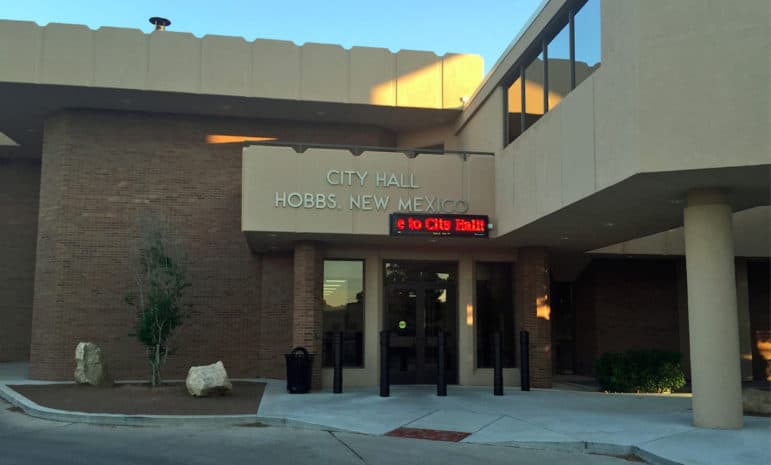
Courtesy photo
City Hall in Hobbs, N.M.
COMMENTARY: It used to be that if a person referred to his or her occupation as being a “public servant,” you might assume there was some level of personal sacrifice to choose public service over the private sector. But I have watched in disbelief how Hobbs City Manager J.J. Murphy has turned his public-service employer into a personal money machine, with the consistently unquestioning consent of Hobbs city commissioners and our mayor.
Fellow Hobbsan Jeanie Coates walked NMPolitics.net readers through the “princely benefits” Murphy amassed in less than three years on the job in a July commentary. Aside from his top-tier salary and his unheard-of benefits outlined by Ms. Coates, there was one item in his compensation package that jumped out at me: paid time off.

Courtesy photo
Byron Marshall
In his initial contract, Murphy negotiated a beginning balance of 160 hours of paid time off (PTO) and would thereafter accrue PTO at a rate of 15 hours per month. The City of Hobbs didn’t even offer PTO as a benefit when Murphy was hired, but he fixed that by convincing the Hobbs City Commission to make the policy change within about five months of being on the job.
In December 2012, claiming an effort to curb sick leave abuse, Murphy proposed converting the City of Hobbs from bifurcated sick leave and vacation to a single PTO benefit. An article in the Hobbs News-Sun on Dec. 30, 2012, quotes Murphy as saying there were 148,000 hours of sick leave on the books and that, after the conversion to PTO, “we will see 20,000 hours of sick leave less per year” and “annual savings to the city will be about $400,000.” As part of the transition, employees would receive buyouts for their vacation and sick-leave balances. What employee wouldn’t love that?
Under the new PTO system, at the close of each calendar year, the City of Hobbs would pay out hour-for-hour the excess PTO above 320 hours for “all general employees” and 456 hours for “shift employees” of the fire and police departments.
Minutes from both the Dec. 17, 2012, and the Jan. 7, 2013, commission meetings provide no record of curiosity by commissioners or the mayor about the new system. Questions should have been:
- Are the projected annual savings realized in actual expenditures, or merely in potential liability on the books?
- What other New Mexico municipalities are on PTO with an annual payout for balances above a set amount?
- What potential abuses are inherent in a PTO system with an annual payout? Could an unintended consequence be that employees will not use their paid time off or will not properly account their time away from work in order to guarantee a year-end windfall payment – in effect, a bonus?
Through a search of documents available on the Internet, I could only find that the City of Alamogordo cashes out PTO, but the municipality limits employees to cashing out no more than 80 hours per fiscal year at a rate of two hours of pay for every three hours of leave.
Unanimous approval
The commission unanimously approved the PTO+payout ordinance at its Jan. 7, 2013, meeting and the conversion was made that same month. Murphy was quoted in the December 2012 News-Sun article as saying the conversion would cost the city between $1.4 million and $1.7 million on the front end. The corresponding pay stubs I reviewed from a public-records request totaled $1,430,196 in gross pay (before deductions). Ranging from $6 to almost $36,000, the average gross pay to each of the 231 recipients was $6,191.
In January of 2014, 83 employees received their first “cap payments” for their excess PTO. Gross pay appearing on the pay stubs that were provided through a records request totaled $163,486, ranged from $32 to nearly $8,500, and averaged $1,969 per recipient.
By Murphy’s first work anniversary in August 2013, his five-year contract was already getting a second rewrite, which included increasing his monthly PTO accrual from 15 hours to 18 hours. Then, in October 2014, Murphy convinced the commission to amend his contract a third time. With just more than two years under his belt as a City of Hobbs employee, he was approved to receive the same rate of PTO accrual as employees who’ve been employed by the City of Hobbs for more than 20 years – 20 hours per month.
Accruing the maximum rate of PTO finally paid off for Murphy. In January 2015, Murphy’s balance of PTO (457 hours in total, 137 hours above the 320-hour cap) yielded a cap payment of $11,418 (before taxes). Including Murphy, 93 employees shared in payouts totaling $216,191 in gross pay, an average of $2,324 per recipient. Payouts ranged from $33 to Murphy’s $11,418.
OK, so now we have an idea of what actual expenditures there have been under this PTO+payout policy. With January 2016 being the third time employees will receive cap payments for their excess PTO, maybe the taxpayers are due a report from the City of Hobbs on what have been the actual savings.
A steep price to taxpayers
Just days after Ms. Coates’ commentary appeared on NMPolitics.net, evoking outcry from readers both near and far, the Hobbs City Commission tabled approving a 3 percent merit raise for Murphy at its July 6, 2015 meeting. Murphy is reported by the Hobbs News-Sun to have said at the time the commission would be honoring his five-year contract by approving a salary bump, which would have taken his annual pay to more than $182,000 – not including benefits.
Soon after the commission tabled the raise, Murphy wrote a letter to the editor of the Hobbs News-Sun, published on July 19, 2015, seemingly trying to justify his raise, with the introduction: “As I approach my three-year anniversary with the city, I wanted to share with the Citizens of Hobbs a recap of the accomplishments that your city government has made during my tenure as city manager.”
More than a month elapsed without a decision by the commission, so Murphy “bowed out” of consideration for the merit raise, according to the Hobbs News-Sun on Aug. 23, 2015. He did still, however, receive a 2 percent COLA (cost of living adjustment) along with all other city employees, taking his salary to more than $176,800, the Hobbs News-Sun reported.
Surely what soothed Murphy’s bruised ego over the forgone raise was the fact that he’d already collected more than $11,400 in January 2015 for his PTO cap payment, as well as the fact he’ll be due another PTO cap payment in January 2016.
I assume Ms. Coates and I are on opposite ends of the political spectrum, but it’s clear that she and I agree on one thing: Our city manager continues to show us that being a “public servant” comes at a steep price to taxpayers. But you get what you pay for, right? Right?
Blanketing the Internet
Don’t take our word for it. Blanketing the Internet are webpages that praise “service-minded” J.J. Murphy, “the city manager every city deserves.” Really. See for yourself.
- slideshare.net/JJMurphyCityManager/jj-murphy-a-serviceminded-city-managercity-manager-of-hobbs-new-mexico
- tackk.com/jjmurphycitymanager
- jjmurphycitymanager.wordpress.com/2015/07/30/j-j-murphy-a-service-minded-city-manager-dedicated-to-the-people-of-hobbs-new-mexico
- jjmurphy-citymanager.yolasite.com
- vimeo.com/album/3538549
- jjmurphycitymanager.weebly.com
- disqus.com/by/jjmurphycitymanager
- jjmurphy-citymanager.tumblr.com
- re.vu/jjmurphycitymanager
- behance.net/jj-murphy-citymanage
- smore.com/a7m25-j-j-murphy-city-manager
- blogs.forbes.com/people/jjmurphycitymanager
A friendly reminder
We can’t say Murphy’s actions regarding PTO proceeded unchecked. The Hobbs City Commission, consisting of six commissioners and the mayor, endorsed Murphy’s PTO proposal unanimously. They approved each of his contract updates unanimously, so that he now accumulates 33 percent more PTO than when he started his job in 2012.
If the commissioners would approve my requests for video broadcasts of their meetings, the wider public would see for themselves that too often Murphy’s proposals receive few, if any, questions, much less discussion that would enter the realm of debate. If the commissioners will not hold Murphy accountable, we as voters must hold them accountable.
So, in closing, I would like to offer my fellow Hobbsans a friendly reminder: Candidate filing day is Jan. 5 from 8 a.m. to 5 p.m. at City Hall. That is the only day to file to be a candidate for mayor and for commission districts 1, 2 and 3 on the ballot.
Marshall is a Hobbs High graduate and former NMSU student. In 2013, Marshall returned to Hobbs from Las Cruces to support and improve his community through activism and enhanced public dialogue about important — and often overlooked — issues that merit the community’s consideration.